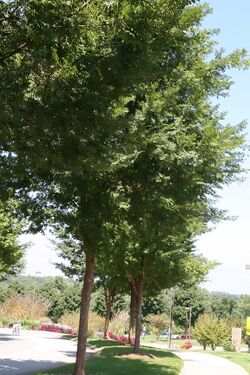Biology:Ulmus parvifolia 'Emer II' = Allee
| Ulmus parvifolia 'Emer II' | |
|---|---|
 Ulmus parvifolia Allee, North Carolina Arboretum, Asheville, NC | |
| Species | Ulmus parvifolia |
| Cultivar | 'Emer II' or 'Emerald Vase' = Allee |
| Origin | US |
The Chinese Elm cultivar Ulmus parvifolia 'Emer II' or 'Emerald Vase' (selling name Allee) was cloned from a tree planted circa 1910 on the University of Georgia campus at Athens.
Description
Allee can reach a height of about 15 m, with a more upright crown shape than its stablemate Athena, its spread approximately 13 m, with arching branches bearing medium green, glossy leaves turning orange to rust red in autumn. [1] The exfoliating, mottled bark has a puzzle-like pattern, and is considered attractive.[1]
Pests and diseases
The species and its cultivars are highly resistant, but not immune, to Dutch elm disease, and unaffected by the Elm Leaf Beetle Xanthogaleruca luteola.[2] As with the species overall, damage caused by Japanese Beetle is relatively slight (< 8% defoliation).[3]
Cultivation
Allee is reputedly drought tolerant, but in the elm trials [2] conducted by Northern Arizona University at Holbrook, Arizona, Allee proved unsuited to the hot, arid climate and sustained over 50% mortality in its first year, as did its sibling Athena. The tree is being evaluated in the National Elm Trial [3] coordinated by Colorado State University. Allee has been introduced to Australia and Europe [citation needed], and was marketed briefly in England by the Thornhayes Nursery, Devon.
Accessions
- North America
- Bartlett Tree Experts, North Carolina, US. Acc. no. 2001-166
- Holden Arboretum, US. Acc. no. 98-26
- Brenton Arboretum, Dallas Center, Iowa, US. One tree, acquired 2009. Acc. no. not known.
- Scott Arboretum, US. Acc. no. 2000-006
- Smith College, US. Acc. nos 302, 33603
- University of Idaho arboretum, US. One tree. Acc. no. 1998010
- U S National Arboretum [4][no|permanent dead link|dead link}}], Washington, D.C., US. Acc. no. 64442
Nurseries
- North America
(Widely available)
- Australasia
- Fleming's Nursery [5], Monbulk, Victoria, Australia.
References
- ↑ Santamour, Frank S.; Bentz, Susan E. (May 1995). "Updated Checklist of Elm (Ulmus) Cultivars for use in North America". Journal of Arboriculture 21 (3): 122–131. http://joa.isa-arbor.com/request.asp?JournalID=1&ArticleID=2673&Type=2. Retrieved 20 June 2016.
- ↑ "Elm Leaf Beetle Survey". Archived from the original. Error: If you specify
|archiveurl=, you must also specify|archivedate=. https://web.archive.org/web/20110719132152/http://www.sunshinenursery.com/survey.htm. - ↑ Brady, C., Condra, J., & Potter, D. (2008) Resistance of Landscape-suitable Elm (Ulmus spp.) Cultivars to Japanese Beetle, Leaf Miners, and Gall Makers. 2008 Research Report, Nursery & Landscape Program, pp 15, 16. University of Kentucky.
External links
- http://www.ces.ncsu.edu/depts/hort/consumer/factsheets/trees-new/cultivars/ulmus_parvifolia.htm[yes|permanent dead link|dead link}}] Ulmus parvifolia cultivar list.
- https://web.archive.org/web/20030413074605/http://fletcher.ces.state.nc.us/programs/nursery/metria/metria11/warren/elm.htm Return of the Elm - the status of elms in the nursery industry in 2000. Warren, K., J. Frank Schmidt and Co.
 |



